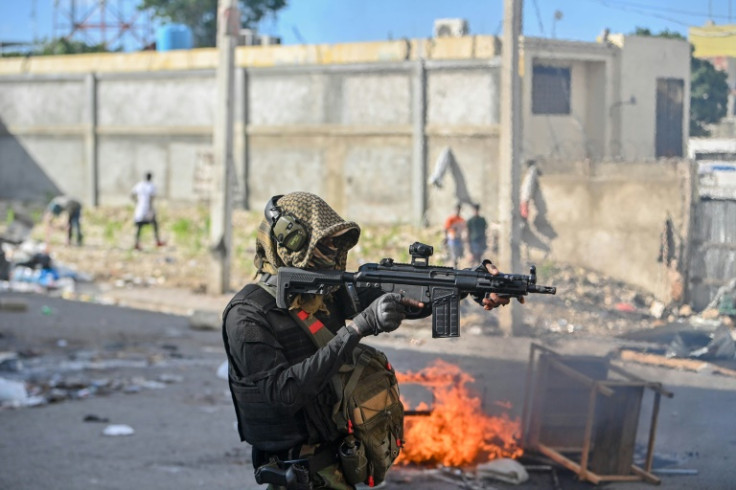
A powerful Haitian gang leader warned Tuesday that the chaos engulfing the capital Port-au-Prince will lead to civil war and "genocide" unless Prime Minister Ariel Henry steps down.
The stark comments from Jimmy Cherizier, known as "Barbecue," came as Henry appeared to be struggling to fly home, with the main airport under attack and neighboring Dominican Republic refusing permission for him to land.
Henry -- who was supposed to step down last month -- was out of the country last week when armed criminal gangs, who control large swathes of the country, launched a coordinated assault to oust him.
"If Ariel Henry doesn't resign, if the international community continues to support him, we'll be heading straight for a civil war that will lead to genocide," Cherizier, a former police officer who is under UN sanctions for human rights abuses, told reporters in the capital.
"Either Haiti becomes a paradise or a hell for all of us. It's out of the question for a small group of rich people living in big hotels to decide the fate of people living in working-class neighborhoods," the 46-year-old added.
As the latest crisis in the violence-wracked Caribbean nation spiraled, gunfire shut down some flights at Toussaint Louverture International Airport in Haiti's capital.
Henry was denied entry into the neighboring Dominican Republic, according to Dominican news group CDN.
On Tuesday evening a spokesperson for the governor's office in nearby Puerto Rico confirmed his plane had landed there, at least briefly. "I don't know if he's still in Puerto Rico," Sheila Anglero told AFP by telephone.
In power since the 2021 assassination of president Jovenel Moise, Henry was due to step down in February but instead agreed to a power-sharing deal with the opposition until new elections are held.
Earlier Tuesday, a police academy in the capital where more than 800 cadets are training came under attack by an armed gang.
The attack was repelled after the arrival of reinforcements, said Lionel Lazarre of the Haitian police union.
The unrest has left 250 Cubans stranded in Port-au-Prince after their flights were canceled, according to the Havana office of Sunrise Airways.
"When we were about to board the plane, they realized that the plane had a bullet hole," a 34-year-old Cuban passenger told AFP via WhatsApp, on condition of anonymity.
Cherizier, who leads a group of gangs known as the "G9 Family and Allies," cites as a chief inspiration Francois "Papa Doc" Duvalier, who ruled Haiti with ruthless brutality in the 1960s and 70s.
He said gunmen had committed harmful acts, but "I believe that society must forgive them and unite to rethink a new Haiti."
Haitian officials have been pleading for months for international assistance to help their overwhelmed security forces, as gangs push beyond the city and into rural areas.
Henry had traveled to Kenya to push for the deployment of a UN-backed multinational police mission to help stabilize his country when the attempt to oust him began.
With him away, the gangs raided two Port-au-Prince prisons, in attacks that resulted in a dozen deaths and the escape of thousands of inmates.
"They're showing us that the police don't matter," Bertony Junior Exantus, a resident of Delmas in Port-au-Prince who fled the violence, told reporters.
At least 15,000 people have recently evacuated the worst-hit parts of the capital, said Stephane Dujarric, spokesman for UN Secretary-General Antonio Guterres.
Due to limited movement, UN teams on the ground have been unable to report a death toll, Dujarric told reporters in New York.
The government has declared a state of emergency and nighttime curfew, while the UN Security Council has scheduled a closed-door meeting Wednesday.
After being brought to a virtual standstill, Port-au-Prince appeared quieter Tuesday, although some streets remained barricaded by residents.
Some transport resumed and shops reopened, with long queues outside of stores, banks and at petrol stations.
In Washington, the State Department renewed a call for calm, though a spokesman declined to address the whereabouts of Haiti's prime minister.




